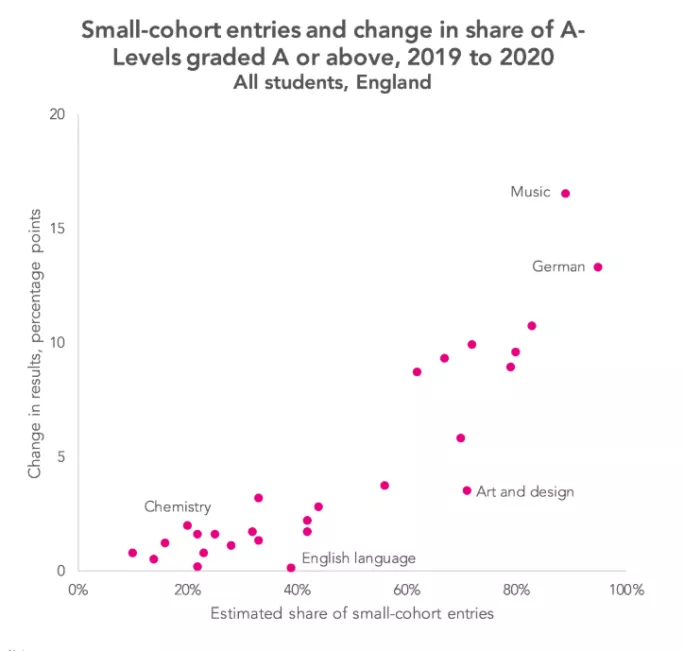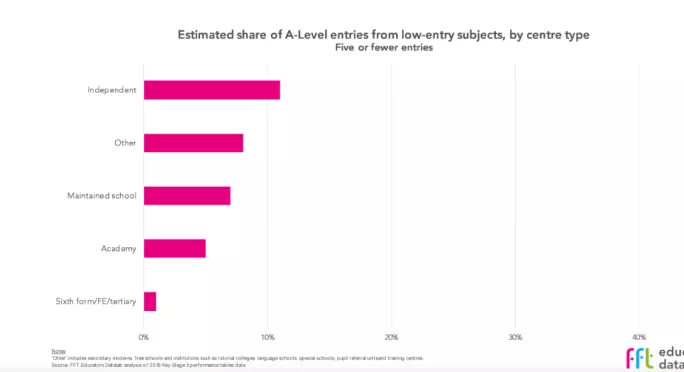- Home
- Exclusive: Ofqual missed A-level private school bonus
Exclusive: Ofqual missed A-level private school bonus

The exams regulator did not consider an in-built advantage for private schools in its A-level grading model this year, Tes can reveal.
As reported yesterday, private schools saw a rise in their proportion of A and A* grades that was more than double the increase for any kind of state school.
The proportion of students attaining the top A and A* grades rose by 4.7 percentage points for private schools.
A levels 2020: Private schools get far larger A/A* rise
Social mobility: ‘No bias’ in grading, Ofqual says
A levels 2020:
- Record percentage get top A* grade
- Science entries in decline
- Maths and English show signs of recovery
In comprehensives, the proportion of pupils achieving the top grade rose by 2 percentage points; in academies, by 1.7 percentage points; and in grammars by 1.2 percentage points.
In a blog today for FFT Education Datalab, statisticians Philip Nye and Dave Thompson point out that teacher-assessed grades were awarded in subjects with a small number of students - five or fewer - which were “typically higher” than those generated by Ofqual’s moderation process.
For cohorts of between five and 15 students, a combination of the teacher-assessed grading and statistical moderation was used.
This meant that subjects with smaller entry numbers were likely to see their proportion of top grades given a boost this year - and independent schools are more likely to do these subjects.
FFT’s data analysis shows that private schools have a far higher number of small-entry subjects such as music and modern languages (see bar chart, below).


The FFT blog said: “That’s our explanation for why independent schools seem to have benefited from the way that grades have been awarded this year - we’ll leave it to others to argue whether it’s right that things have worked out this way.”
However, Ofqual’s technical report, released yesterday, only mentions independent schools in relation to a detail about the standardisation model - that “all students…are matched to their prior attainment, except for GCSE, where students from independent and selective schools are excluded”, as there is a different relationship between their prior attainment and outcomes compared with most other students.
But the report does not mention any equity analysis regarding the in-built advantage the statistical modelling gives independent schools.
Robert Halfon, chair of the Commons Education Select Committee, said: “If this is true, it’s extraordinary. It shows again why they should have published their standardisation model weeks ago so there could have been proper scrutiny, to iron out these kinds of problems.”
He added that in this year’s results, “you’ve got failing schools where there might be a good cohort of kids even within that failing school, or who will have been marked down unfairly because of the history of the school, for example”.
“As a select committee, our exams report in July said very clearly that Ofqual should publish its standardisation model early on, so there could be proper scrutiny and so proper changes could be made if necessary - they refused to do that,” he said.
“And these anomalies have to be explained by Ofqual, and they need to work very closely with schools, with colleges, with the pupils to explain where it appears that their algorithm has penalised disadvantaged students, colleges or whoever it may be.”
Geoff Barton, general secretary of the Association of School and College Leaders, said: “It appears that any subjects and schools with small groups of students have done better than those with larger groups.
“This is because the statistical model used by the exam boards couldn’t be applied to small groups so teacher-assessed grades stood, whereas in larger groups the statistical model was applied and grades were moderated down.
“So, small-entry subjects have seen a larger increase in top grades, as have independent schools as they tend to have smaller groups than state schools, which have less funding available.
“Nobody saw this coming but it has created an obvious social inequity and it is one of the reasons we are calling for an urgent review to ensure fairness for all. For a government that talks about ‘levelling up’, it should be a critical issue.”
Ofqual has been contacted for comment. Yesterday, it said there had been “simply no evidence” of bias in the grading process.
However, the regulator’s statistics showed a higher proportion of poorer pupils were knocked out of the A*-C bracket after teacher-assessed grades were moderated.
Keep reading for just £1 per month
You've reached your limit of free articles this month. Subscribe for £1 per month for three months and get:
- Unlimited access to all Tes magazine content
- Exclusive subscriber-only stories
- Award-winning email newsletters



